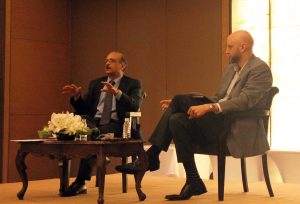Duke Global Executive MBA Student Blog

Exploring Global Markets and Institutions in India

This blog was written prior to the Cross Continent MBA program merger with the Global Executive MBA program.
One of the reasons I chose the Cross Continent MBA (CCMBA) program was the Global Markets and Institutions course that spans most of the length of the program. Having done a business degree as an undergrad, I had a basic idea of what the core courses would offer, and really wanted to learn something new with my MBA. In addition, I’m a history nerd (with an art history obsession) and I thought learning about the political and economic histories and institutions of each of the regions we would travel to would be fascinating. The combination of residencies, conversations with my classmates, and this multi-term comparative course is helping me learn more than I ever expected.
I recently returned home after an amazing residency in New Delhi. It was my first trip to India, and I found exactly what I had been hoping for: that visiting a new, sometimes intimidating destination with Fuqua and my CCMBA classmates made for the richest, most informative, and fun experience I could imagine. My classmates from India were so energetic about sharing a piece of their country with us, and the chance to ask questions of them about day to day life, politics, culture, and traditions was simply invaluable.

If you want to get a sense of what the global markets course is all about, pick up a copy of “Why Nations Fail” by Daron Acemoğlu and James A. Robinson. We’re reading a few chapters in class, and I have found it to be a helpful framework for considering why countries develop the way they do. The book describes a theory: that some countries have “extractive” political and economic institutions, marked by a few individuals getting power and wealth at the expense of the masses—and that some countries have developed more inclusive institutions where a greater proportion of people benefit from the way the economy and the government operate. Since the Industrial Revolution, countries that are more inclusive tend to grow faster, and have all the correlating benefits of quality of life and health.
India was the ideal location to start thinking through this framework, because it offers some pretty wide variation between inclusive and extractive institutions.

As part of our global markets course in Delhi, we heard from guest speaker Nikhil Sinha who has held senior leadership positions in business and academia in both the U.S. and India. He gave us an honest and interesting view into the conversations inside board rooms in both places. Here are a few highlights of what we heard:
- Corruption is rife in Indian government, but the private sector has already begun to move away from graft toward above-board deals. Mr. Sinha proudly declared that the company he works with does not pay bribes.
- There are several layers to India: tier 2 towns, tier 3 towns, rural villages, and tier 1 urban areas. Delhi, for example, has 19 million people (that’s nearly half the population of South Africa, where I live today), and is more populated than half the countries in the world. The earning power, lifestyle, education opportunities, and regional cultures of people throughout India vary enormously. Any company looking to enter the Indian consumer market needs to understand which segment of this giant population it wants to serve.

Lunch at our classmate Sandeep’s (center) family farm in Jaipur - Entrepreneurship is growing in India and is the biggest source of employment in the country. Many people went abroad for education and work opportunities, and are now coming back to India to start businesses.
- Business culture in India is largely Western, with a few key differences: in India, many businesses are family-owned, so shareholders also sit on the board of directors. This makes shareholders more powerful in Indian companies.
- Best advice for people looking to learn about the country: travel around India. To the point above about the diversity of the country, if you’ve seen Delhi, you have only seen Delhi.
If I were pressed to choose, I would say the greatest value I’m getting out of the unique CCMBA program is the chance to compare. The global markets course has given me a valuable framework for structuring that comparison, between India and China, or China and Chile, or the U.S. with any of these countries. I am broadening my understanding with each residency in a way that I don’t believe I would have done in any other MBA program.



